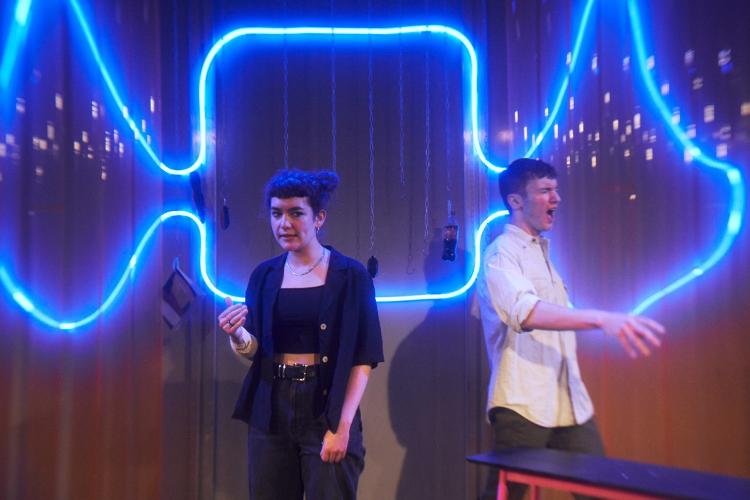Sophie Leydon’s Rapture does not make it difficult to transcend into the exploration of queer identities at the Pleasance Theatre. A pink neon sculpture is mounted to the wall, framed by colourful PVC curtains and a projection of the word ‘Rapture’. Three east London flatmates dipped in welcoming pink and red lights emerge from behind the curtain as they brace themselves to face the hardships of young adult life – and more importantly – their queer identities.
Pink Sky Theatre Company’s Rapture takes its time to establish itself. Partially through lengthy monologues, and partially through semi-realistic discussions in which flatmates Rosy, Tommy and Kit explore their relationships with each other. They are as close as a family could never be and whatever life throws at the three characters, they will face it together. As a union and as a family – or so it seems.
Sexual assault, losing loved ones, and struggling with mental health are the three themes that the individual characters embody. As realistic and relatable as these topics are, it is hard to stay oblivious to the seemingly obligatory examination thereof. Although intertwined in the different storylines, one can’t help but wonder why every queer storyline has to incorporate some sort of trauma.
Writer and director Leydon, however, is not apologetic about the thematic decisions as she has each actor deliver long-winded monologues exploring their inner turmoil in poetic euphemisms and metaphors. Among the speeches and the scenic imagery, the actors paint with their words, breakups, falling-outs, and deaths in the family fail to move the audience. Added to that is a continuous, lulling background score by MWEN that adds to the rhythmic calamity of the cataclysmic piece.
Although Tommy, Rosy and Kit go back and forth from hating to loving to hating each other, Verity Johnson’s set design hesitates to hint at their struggle. Minimalist benches and tables find multiple purposes in the play, and props that are hanging in front of the white canvas used for the occasional projection, are often accessed by the actors. Cleverly, the three protagonists keep passing a microphone between each other and the wall mount to signify a change in perspective and personal experience.
As beautifully as the three actors explore the emotional experience of their characters and toy with the concept of queer safe spaces and what it takes to preserve them, the purpose of the play keeps taking a backseat to long recollections of events, and a lack of variation in exposition.
It runs until 17 July.
Review: Shirley Both Photo: Evelina Polyakov

